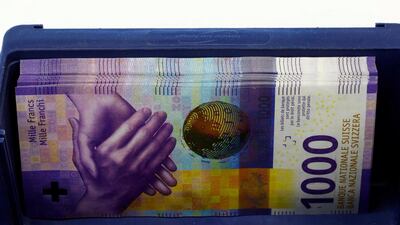The US Treasury Department designated Switzerland and Vietnam as currency manipulators in the Trump administration’s final foreign exchange policy report.
The agency stopped short of labeling China a currency manipulator and instead kept the world’s second-largest economy on a watchlist. The Treasury urged China to “improve transparency” in its currency management, especially of its central bank’s relationship with state-owned banks.
“Treasury will follow up on its findings with respect to Vietnam and Switzerland to work toward eliminating practices that create unfair advantages for foreign competitors,” Treasury Secretary Steven Mnuchin said in a statement released on Wednesday in Washington. The document scrutinises the currency practices of 20 countries for potential manipulation over the four quarters through to June.
Thailand, Taiwan and India were added to the agency’s “monitoring list” for even closer monitoring, while Japan, Korea, Germany, Italy, Singapore and Malaysia remained, along with China.
Designation as a currency manipulator comes with no immediate penalties but can escalate trade tensions.
Wednesday’s release was the first semiannual foreign exchange report this year. The Treasury’s first report was officially due in April, but was delayed initially because of the coronavirus pandemic. A second one was due in October.
Countries that meet two of the three criteria are placed on the watchlist. The US has previously made the manipulation designation twice – both times for China – in the 1990s and in August 2019.
Mr Mnuchin in January lifted a manipulation charge on Beijing – just two days before the US and China signed a long-awaited trade agreement.
It was the first time for Switzerland and Vietnam to be labelled as manipulators. Each met all three of the criteria, while China met one of the three.
While the Swiss franc appreciated – by more than 3 per cent against the dollar over the 12 months through June – the Treasury said that authorities intervened heavily in the currency market to stem gains propelled by safe-haven demand.
“Switzerland conducted large-scale, one-sided intervention, significantly larger than in previous periods, to resist appreciation of the franc and reduce risks of deflation,” the agency said.
While noting that financial markets were volatile, the Treasury concluded that at least some of the Swiss intervention “was for purposes of preventing effective balance of payments adjustments”. The agency suggested the Swiss National Bank look at “domestic quantitative easing” to help balance its monetary policy mix.
Noting the rapid rise of Vietnam’s trade surplus with the US, the Treasury called for the Southeast Asian country to allow its managed currency to appreciate more rapidly to help address external imbalances.
The Treasury said Vietnamese authorities reported to the US that they had made net purchases of foreign exchange of $16.8 billion over the four quarters through June, equivalent to 5.1 per cent of gross domestic product. The agency called for greater transparency in managing the dong, and the modernisation of monetary tools so the country can rely less on currency intervention.
Vietnam should also reduce trade barriers to allow a level playing field for American firms and workers, the Treasury said.

